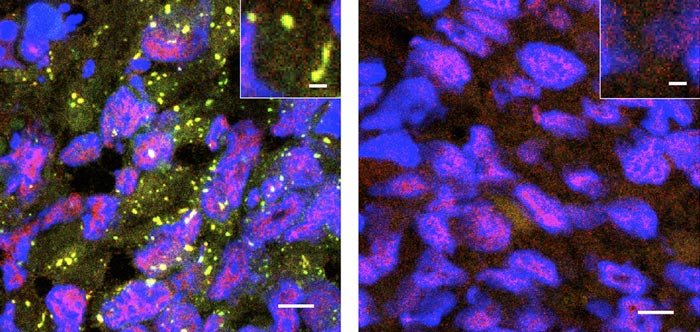Stress Granules Ease the Way for Cancer Metastasis

Somasekharan et al., 2015 Fewer stress granules (yellow) occur in cancer cells lacking G3BP1 (right) than in controls (left). Nuclei are labeled blue.
When cells are under duress, they curtail almost all protein synthesis and stash their mRNAs in stress granules. These structures help healthy cells, but they also allow tumor cells to survive harsh conditions. A protein named YB-1, which is overexpressed in many types of tumors, accumulates in stress granules, but researchers don’t know how YB-1 affects these particles.
University of British Columbia scientist Poul Sorensen and his colleagues found that stressed-out cancer cells need YB-1 to assemble stress granules. Removing YB-1 decreased levels of one stress granule protein, G3BP1. The team discovered that YB-1 attaches to the mRNA encoding G3BP1 and stimulates the protein’s production.
To determine the effects of YB-1 in animals, the researchers implanted mice with cancer cells that either made or lacked the protein. A month later, cells in the control tumors carried more stress granules than did the tumor cells missing YB-1.
Sorensen and colleagues then implanted mice with tumors that either produced or lacked G3BP1. The control tumors harbored more stress granules than did the G3BP1-deficient tumors, and only the control tumors metastasized.
Further research is needed to find out how the reduction in stress granules curbs metastatic spread, but the results suggest that inhibiting their formation might be a way to curb cancer metastasis.
Somasekharan, S.P., et al. 2015. J. Cell Biol. doi:10.1083/jcb.201411047
About The Journal of Cell Biology
The Journal of Cell Biology (JCB) is published by The Rockefeller University Press. All editorial decisions on manuscripts submitted are made by active scientists in conjunction with our in-house scientific editors. JCB content is posted to PubMed Central, where it is available to the public for free six months after publication. Authors retain copyright of their published works, and third parties may reuse the content for non-commercial purposes under a creative commons license.
For more information, please visit www.jcb.org
Research reported in the press release was supported by the Terry Fox Research Institute, Prostate Cancer Canada-Movember Foundation, German Research Foundation , and British Columbia Cancer Foundation.
Contact Information
Rita Sullivan King
Communications Manager
news@rupress.org
Phone: 212-327-8603
Media Contact
All latest news from the category: Life Sciences and Chemistry
Articles and reports from the Life Sciences and chemistry area deal with applied and basic research into modern biology, chemistry and human medicine.
Valuable information can be found on a range of life sciences fields including bacteriology, biochemistry, bionics, bioinformatics, biophysics, biotechnology, genetics, geobotany, human biology, marine biology, microbiology, molecular biology, cellular biology, zoology, bioinorganic chemistry, microchemistry and environmental chemistry.
Newest articles

Innovative vortex beam technology
…unleashes ultra-secure, high-capacity data transmission. Scientists have developed a breakthrough optical technology that could dramatically enhance the capacity and security of data transmission (Fig. 1). By utilizing a new type…

Tiny dancers: Scientists synchronise bacterial motion
Researchers at TU Delft have discovered that E. coli bacteria can synchronise their movements, creating order in seemingly random biological systems. By trapping individual bacteria in micro-engineered circular cavities and…

Primary investigation on ram-rotor detonation engine
Detonation is a supersonic combustion wave, characterized by a shock wave driven by the energy release from closely coupled chemical reactions. It is a typical form of pressure gain combustion,…



